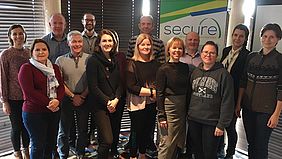SECURE, or Smarter Energy Communities in Northern & Arctic Regions project, funded under Northern Periphery and Arctic Programme 2014 – 2020, has finished its innovation path and achieved all its energy efficiency goals and objectives.
With a budget of €1.8 million, SECURE fostered energy-secure communities in Ireland, Northern Ireland, Faroe Islands and Sweden through the promotion of energy efficient and renewable solutions. “The main objective was to maximise transnational cooperation to transfer and implement innovative energy solutions for public housing and infrastructure across 7 NPA regions, in Europe and Atlantic Canada”, explains Dr Caitriona Strain, SECURE project leader. Knowledge transfer was demand-led, supported by a quadruple helix approach, and it was maximised by focusing implementation on small NPA communities and building up local authority capacity.
According to Dr Strain, the common territorial challenges tackled were high energy costs and low competition due to peripherality, low population density, low accessibility and cold climates. “We focused on opportunities to harness our natural resources through transnational cooperation. This helps ensure the sustainable use of resources by harnessing our climatic opportunities, preserving environmental quality and exploiting our natural resources”, adds Caitriona. These achievements are evidenced by the following project results:
- Creation of 5 Smarter Energy Communities in Leitrim and Donegal (Ireland), Derry City & Strabane (Northern Ireland), the Faroe Islands and Västernorrland (Sweden)
- 31 energy solutions applied which improved the energy consumption classification of 38 houses
- Alternative energy sources installed in 10 public infrastructures
- Increase in energy efficiency of at least 5% in 22 public buildings
- Identification and promotion of more than 30 good energy practices across 7 NPA regions
- Engagement with more than 170,000 citizens across the participating regions
Examples of SECURE’s achievements
Project partners achieved many outputs working together, learning from other partner regions and developing new networks. Thanks to SECURE’s approach, the project packaged new models and solutions from higher energy mature regions, like Nova Scotia (Canada) and North Karelia (Finland), as services for delivery to other parts of the Northern Periphery Area. In that way, the following five regions established Smarter Energy Communities. They carried out a programme of activities to engage and empower their citizens to become energy leaders, and to improve the capacity and readiness of local/regional authorities to manage climate risk and exploit natural resources. These are some of the examples of energy pilots that have been implemented:
• Donegal (Ireland): installation of an Intelligent heating management system. According to Paddy Mullen, Facilities Manager at Donegal County Council, in 2018 a target reduction of 4% was set for thermal heating fuel consumption in Carndonagh Public Services Centre. However, “the actual reduction, factoring in weather conditions, appears to be well ahead of target”. The installation of the intelligent heating system, and incorporating cloud-based management software, remote access, wireless thermostats and valves through the SECURE project helped achieve this target.
• Derry and Strabane (Northern Ireland): Derry City and Strabane District Council identified 40 energy reduction actions through SECURE. Among others, Energy Manager Leo Strawbridge, highlighted the installation of 12 kW of Solar PV linked to a 15kW intelligent battery storage system in the Irish Street Community Centre, installation of a more efficient boiler in Derry’s civic offices, and the installation of a Combined Heat and Power system in Foyle Arena leisure centre.
• Västernorrland (Sweden): the Association of Local Authorities in Västernorrland have achieved several energy improvements in two public elderly homes, Ärebo and Vallänge. Jennie Olofsson, Operations Manager at the Energy Office in Västernorrland, explains that they achieved an 8% energy reduction in Ärebo public elderly home. In Vallänge, they replaced the existing boiler with a 48kW heat pump installation, insulated the roof and implemented an energy efficient rotating heat recovery system to reduce its energy use by approximately 50%.
• Leitrim (Ireland): Leitrim County Council reduced its annual oil consumption in a public building by €3,000 through the implementation of a new Building Management System. Nicola McManus, Economic Development Manager, explains that the local actions taken through SECURE have achieved an energy consumption reduction of between 10% and 25% in The Dock Arts Centre, Ballinamore Library and Manorhamilton Library. Furthermore, a Renewable Energy Strategy for County Leitrim has been developed to continue SECURE’s work beyond 2021.
• Faroe Islands: the focus of the Faroese partners was in promoting (ground source) heat pumps, electric cars and renewable energy production. Bjarti Thomsen, Renewable energy advisor at Umhvørvisstovan Environment Agency, mentions that the investigation in energy efficient sources has continued during the lifetime of the project and has benefited the results obtained by his agency.
Sharing energy expertise
The two partner regions with higher energy maturity expertise guided the partnership towards these excellent results.
• Nova Scotia (Canada): Canadian energy expertise inspired our European regions. SECURE’s partner, the Ecology Action Centre, is highly experienced in energy efficiency and renewable energy solutions. As Emma Norton says, the expertise and good practices coming from Atlantic Canada have been very meaningful for the communities located in Ireland, Northern Ireland, the Faroe Islands and Sweden, during the process of building their Smarter Energy Communities. As well as producing valuable videos that showcase local good energy practices, EAC also conducted a series of surveys within the SECURE regions which revealed many interesting conclusions.
• North Karelia (Finland): Finnish expertise helped to develop smarter energy communities in the Northern Periphery Area. Helena Puhakka-Tarvainen, Project Manager at Karelia University of Applied Sciences, explains that to assist partners with their ‘Smarter energy communities programme’, Karelia UAS shared the results of their ‘Roadmap for Oil-free North Karelia 2040’, SciFest workshop experiences, Energy Saving campaigns and webinars. Finnish partners also led one of SECURE’s main activities (the transnational knowledge transfer programme), which identified good energy practices and how they could be replicated across other regions.

